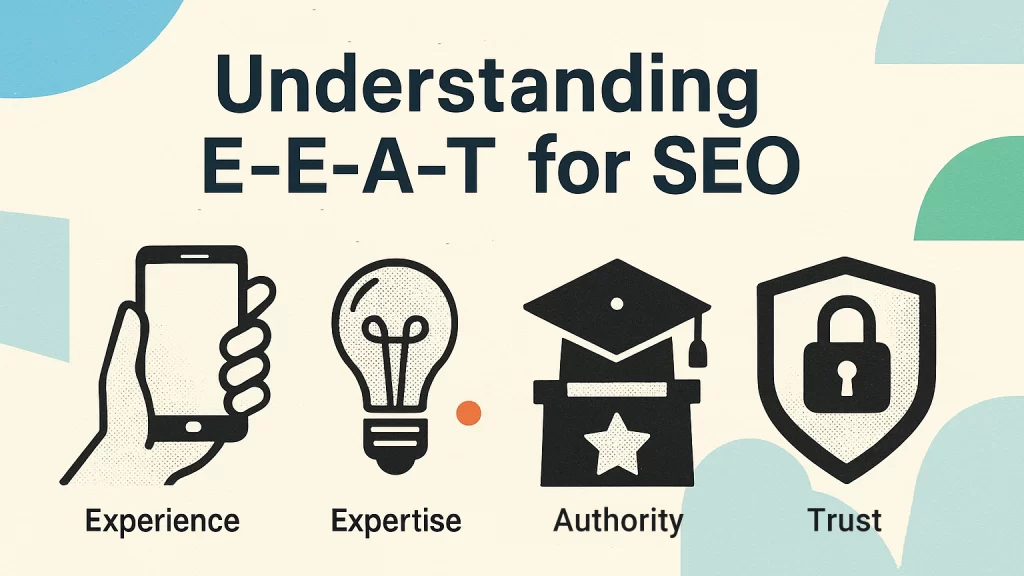
Search engine optimization (SEO) has evolved far beyond keyword placement and backlinks. In today’s digital landscape, Google focuses heavily on content quality, user experience, and credibility. This shift is guided by the concept of E-E-A-T, which stands for Experience, Expertise, Authority, and Trust. Originating from Google’s Search Quality Rater Guidelines, E-E-A-T now plays a crucial role in determining how content is ranked and perceived online. Understanding how E-E-A-T influences SEO is essential for brands, marketers, and content creators aiming to build sustainable visibility and reputation.
Understanding E-E-A-T –
E-E-A-T represents four critical pillars that define content credibility. Experience refers to the firsthand knowledge of the topic by the content creator. Google values content written by people who have actually used a product, visited a location, or lived through a situation. Expertise relates to the depth of knowledge or skill possessed by the author. For example, a financial advisor writing about investment strategies or a healthcare professional discussing medical topics reflects expertise. Authority measures how recognized the author or website is within the field—often established through citations, backlinks, and mentions from other credible sources. Finally, Trust is the foundation of all three elements and focuses on transparency, accuracy, and the overall reliability of the information provided.
Why E-E-A-T Matters in Modern SEO –
E-E-A-T has become essential because Google aims to prioritize content that provides genuine value to users. Search algorithms are now designed to identify content that demonstrates real insight, rather than content that simply checks SEO boxes. This shift places greater emphasis on the authenticity and reliability of what users find online. For websites in sensitive industries—often referred to as Your Money or Your Life (YMYL) topics such as health, finance, or safety—E-E-A-T becomes even more significant, as misinformation can have serious consequences. High E-E-A-T content not only boosts rankings but also enhances brand credibility, builds user trust, and encourages repeat visits.
Experience: The Value of Real-World Insight –
The first component, Experience, focuses on whether the creator has personally engaged with the topic. Google wants to promote content that feels authentic and demonstrates firsthand knowledge. For instance, a product review written by someone who has actually used the product will carry more weight than one compiled from secondary sources. To enhance this factor, content creators should include personal anecdotes, original photos, case studies, or data from real-life experiences. This approach not only boosts search relevance but also connects more deeply with readers seeking practical, trustworthy insights.
Expertise: Demonstrating Knowledge and Skill –
Expertise plays a key role in establishing content quality. It’s about demonstrating that the author understands the subject deeply and can explain it clearly. Expertise can be shown through qualifications, years of experience, or consistent creation of in-depth, accurate content. Including an author bio with credentials, linking to credible references, and avoiding generic or vague statements can strengthen this pillar. In professional or technical domains, Google particularly values content produced by experts with proven subject matter authority.
Authority: Recognition from the Industry –
While expertise relates to the creator’s knowledge, Authority measures how others view that knowledge. A website or author gains authority when recognized as a trusted source within a community or industry. This recognition often comes from high-quality backlinks, brand mentions in reputable publications, and active engagement within the field. Building authority takes time but can be accelerated through guest posts, speaking engagements, citations, and collaborations with established organizations. The more others refer to your content as a reliable source, the stronger your authority becomes in the eyes of both Google and users.
Trust: The Core of Sustainable SEO –
Among all elements of E-E-A-T, Trust is the most crucial. Without trust, expertise and authority lose their impact. Trustworthiness depends on the website’s overall transparency, the accuracy of its information, and the security it provides to users. For example, websites should use HTTPS, clearly display contact information, and cite reputable sources. Including user reviews, privacy policies, and feedback mechanisms can also help reinforce credibility. When users feel confident in a website’s integrity, they are more likely to engage, convert, and recommend it to others—further strengthening its SEO performance.
Optimizing for E-E-A-T –
To effectively integrate E-E-A-T into your SEO strategy, focus on creating content that is original, well-researched, and written by qualified individuals. Highlight author profiles and credentials, ensure that every piece of information is verifiable, and encourage user engagement through reviews and feedback. Building high-quality backlinks from reputable domains can enhance authority, while regular content updates demonstrate ongoing commitment to accuracy. Above all, maintain transparency and consistency across all pages, as Google values trustworthy and well-maintained sites.
Conclusion –
In the evolving world of SEO, E-E-A-T has redefined what quality means online. It’s not just about ranking—it’s about credibility, relevance, and genuine user value. Brands that prioritize experience, showcase expertise, establish authority, and maintain trust are far more likely to achieve lasting visibility in search results. As AI-generated and low-quality content continues to flood the web, Google’s emphasis on E-E-A-T ensures that authentic, reliable information rises to the top. For marketers and businesses, embracing these principles isn’t just good SEO practice—it’s the foundation for sustainable digital success.

